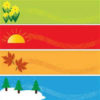Strangely, as the places around the world seem to have very different climate and we associate this season with winter, the actual universally symbolic element is the winter solstice. Many of even the modern traditions are focused on and symbolize the observation of the lengthening hours of sunlight, the observed resurgence of the “son/sun.”
The universal elements of the winter solstice holidays usually are meant to be a renewing of hope, and a reassurance of the fertility of the new year. The new year only starts in January in the Roman calendar, but it starts in December using a lunar calendar. Someone was commenting earlier in December how she felt almost like a new year had begun. Even in this day and age, we do still have a sense of the rhythms that led to natural calendars and seasonal holidays in the first place.
Many of our modern Christmas imagery stems from the old Celtic feeling of spiritual kinship with trees, and the evergreens in particular were seen as evidence of vibrant life even in the face of what seemed then, and even to a degree now, as a season of death. The association of the colours red and green were connected to a tree and spirit they knew as the Holly King. He was seen as the winter incarnation of the sovereign divinity himself. Many of the faiths that venerate both the earth and an attendant god see the relationship between holly trees and the seeming state of the earth as particularly hopeful. A reassurance of the rebirth of animals from their dens, and flowers from the earth.
The winter was considered the season of the underworld, and they referred to the male divinity who was most often connected to the sun as the ‘unconquered‘. This is why, though the Bible gives no date for Christ’s birth, they mark it on that day implying that none are more deserving of the title of ‘unconquered’ than Jesus. The death and resurrection are rather universal imagery, including a decent into and return from the underworld. There have been many legends of it in all of the Semitic faiths as well as European celebrations.
I have heard the cycles of the seasons have also been connected to manifestation. Different ability or stages at different times of year? The idea of wishes coming true on Christmas is sort of an observation on that process. The human creative process does seem to be able to piggy back on the forces of nature if the individual observes the “feeling” or spirit of the season. Often winter is an enforced meditative stage or was, so it gave people plenty of time to consider their desires and hopes and to even make “New Years resolutions.” This is sort of the point of declaring a goal for the whole year at that time, and it best served people then and now, if it was something large. This is part of why the Holly King was respected and beseeched, because that evergreen seemed to have power even in winter that lent powerful support to what they would have come the next year. Wishing wells have the same link to the underworld, which was both the place of death and rebirth.
Kwanzaa is the African holiday. They celebrate an ancient cultural hero. It is a very old tradition, but even Chanukah is a light festival. There is a world wide veneration of light. St Lucia in Sweden too. Even in the rather unwintry Italy they celebrated a holiday called Lupercalia. This is where the idea of wild revelry and gift giving came from.
Do the Muslims also have connection with the seasons? Ah, they do. In their case it’s a period of prolonged piety, and gift giving is not forbidden by their faith. It is just not innately traditional. The term Muslim does mean roughly pious one. They see it as very rewarding, and is basically meditative.
Your thoughts are welcome. Be well friends.
Travis Saunders
Dragon Intuitive
~science,mysticism,spirituality~



Leave a Reply